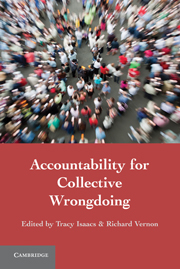Book contents
- Frontmatter
- Contents
- List of Contributors
- Acknowledgments
- Introduction
- PART I COLLECTIVE ACCOUNTABILITY IN INTERNATIONAL LAW
- PART II DISTRIBUTING ACCOUNTABILITY
- 7 Reparative Justice
- 8 The Distributive Effect of Collective Punishment
- 9 Citizen Responsibility and the Reactive Attitudes: Blaming Americans for War Crimes in Iraq
- 10 Kicking Bodies and Damning Souls: The Danger of Harming “Innocent” Individuals While Punishing “Delinquent” States
- 11 Punishing Collectives: States or Nations?
- Index
11 - Punishing Collectives: States or Nations?
Published online by Cambridge University Press: 05 June 2012
- Frontmatter
- Contents
- List of Contributors
- Acknowledgments
- Introduction
- PART I COLLECTIVE ACCOUNTABILITY IN INTERNATIONAL LAW
- PART II DISTRIBUTING ACCOUNTABILITY
- 7 Reparative Justice
- 8 The Distributive Effect of Collective Punishment
- 9 Citizen Responsibility and the Reactive Attitudes: Blaming Americans for War Crimes in Iraq
- 10 Kicking Bodies and Damning Souls: The Danger of Harming “Innocent” Individuals While Punishing “Delinquent” States
- 11 Punishing Collectives: States or Nations?
- Index
Summary
The idea of collective liability comes into play because it seems right to attribute acts to collectives that cannot plausibly be seen as acts of their members, or even as a simple aggregation of their members' actions. To the extent that liability can be individually assigned, or to the extent that some or all members contributed personally to some portion of a blamable action, individual liability (selective or across the board) is all we need. However, as all of the chapters in this book have argued, individual liability often fails to match reality. As several chapters have noted, that point was perhaps most strikingly made by Arendt's “banality of evil” construct: not all or even most of those whose complicity is essential to evil acts are themselves essentially evil. If they were, the right retributive response would be to try them, one by one, for their deeds, if one could. (If the number of offenders is high, the problem, although severe, is practical, not conceptual.) The reason for not doing so is that collectives have features that their members do not have: first, individual behavior is profoundly conditioned by the collective context; second, collective action has consequences that are not the intended consequences of many of those who contribute to it. Both causes and effects are latent, as it were, in the agents' social and political context.
- Type
- Chapter
- Information
- Accountability for Collective Wrongdoing , pp. 287 - 306Publisher: Cambridge University PressPrint publication year: 2011
- 4
- Cited by



